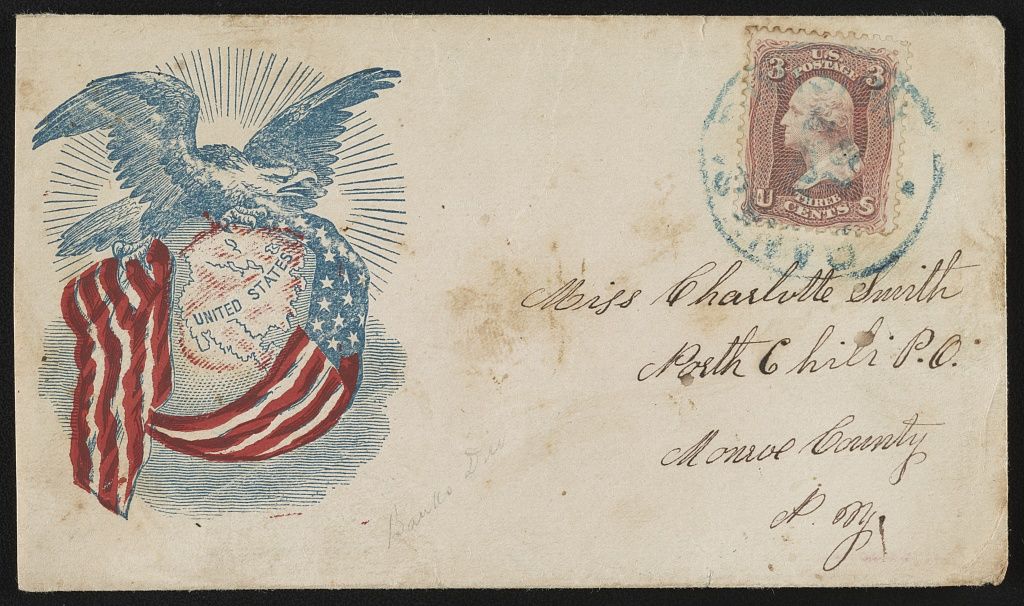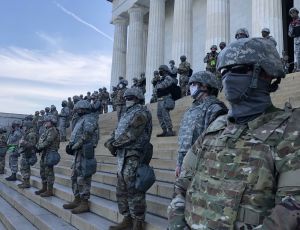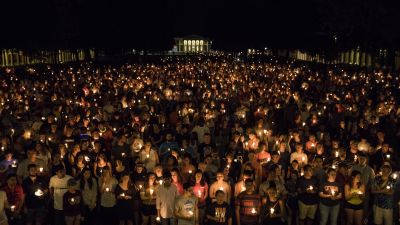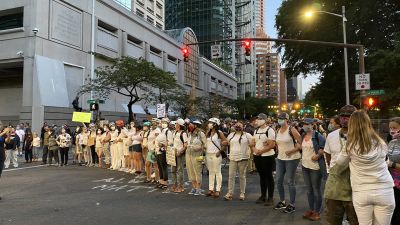
Civil War era envelope, addressed to Miss Charlotte Smith, North Chili P.O., Monroe County, N.Y.; bears 3 cent stamp. (LOC)
BILL MOYERS: Heather Cox Richardson, thank you very much for joining me.
HEATHER COX RICHARDSON: Oh, it’s a pleasure to be here.
BILL MOYERS: Some years ago, I did an interview with Saul Bellow, the novelist. He said, “Moyers, in the future, no one will be heard who doesn’t speak in short bursts of truth.” And I think he would applaud the short bursts of truth that we get in your LETTERS FROM AN AMERICAN every day. You’ve attracted a large and faithful following on Facebook and other venues, including BillMoyers.com. I’m among the several hundred thousand people who wake up every morning to find out what you’ve seen in the news that I need to know and likely missed. How did that come about? And did you anticipate the response that you’re getting?
HEATHER COX RICHARDSON: The newsletter was completely an accident, and I have my readers to thank for it. I had on Facebook a professional page that I posted on about once a week. And I hadn’t written on it in a while in the summer last year because I was actually busy moving. And I was all set to get in the car and drive from my home in Maine to teach in Boston. And I happened to be stung by a yellow-jacket, and I’m allergic to them. And I didn’t have my EpiPen nearby. So I didn’t dare get on the road until I knew how badly I would react. And I thought, “Well, I haven’t written in a while on my Facebook page.” And I know that on Friday, Friday the 13th, September 13th, Adam Schiff wrote a letter to the acting director of national intelligence at the time saying, “We know there’s a whistleblower complaint out there. And we know that you have it, and we know that you’re supposed to give it to us, and you’re not. And that means that we have to assume it’s a really big deal. Hand the stupid thing over.” And of course, I paraphrase, but that was the gist of it. And I recognized because I’m a political historian, that this was the first time that a member of Congress had found a specific law that they were accusing a specific member of the executive branch of violating. So I thought, you know, I oughta put that down, ’cause this is a really important moment. If you knew what you were looking for, it was a big moment. So I wrote it down, and then got myself back to Boston and got home and there were a ton of questions about what I’d written. And it was clear that the readers wanted to know more. They seemed to want to know the answers, so I wrote again, I think it was two nights later on the 17th. And I’ve written every night since because questions just poured in, and people flooded me with questions about what was going on, and who were the players, and how was this going to play out? And what were the laws, and why should I have any hope that this was gonna turn out in a good way? And this was just something that really was sort of reader-driven, not driven by me at all. And I think that’s probably why it’s had such staying power.
BILL MOYERS: When you write, do you imagine who might be reading? Can you see particular people or individuals that enables you to connect almost personally with them, as if your letter was to me or to someone else who is among those 400- 500,000 people who read you every day?
HEATHER COX RICHARDSON: I have always been a letter writer, and I found when my numbers got over half a million, I couldn’t think about how many people there were out there. I had to think as if I were writing a letter to my brothers and sisters, to my good friends with whom I have had a correspondence since I could hold a pen. I think if it were truly a private letter, I would, you know, make jokes more, or probably use less formal language in some cases. But I always have to think that I’m writing to my friends, and I think maybe that comes through.
BILL MOYERS: Many of the letters are postmarked after midnight, 1:30, 2:20, 3:10. When we wake up, there you are. What toll does it take to keep writing at that hour night after night?
HEATHER COX RICHARDSON: I’m very tired. And it definitely takes a toll. Producing 1,200 words every day, when you’re already working a full-time job is a lot. That being said, it feels like this is a crisis moment in America. And I certainly would not have been doing this ten years ago. But you think of all the sacrifices that people have made to keep this country a democracy and to keep it healthy and to try and keep it equal. It seems to me to be a small price for me to pay to take the extraordinary training I’ve had and all the privilege I’ve had in my life and, you know, stay up a little bit later than I would like to. So the people who really deserve credits are the people in my family who are really understanding about the fact that every night the minute we finish eating, I usually actually put my head down on the dining room table or on my desk and sleep for an hour or two. And then they’ve all gone to bed when I pick my head back up and start typing. And they’ve been really good about it. And I have promised them that it won’t go on forever.
BILL MOYERS: I like this one from the 11th of July, you write, “As you all know, the news dumps in the last couple of days have kept me writing until the sun came up. But while I’m finally going to bed on these late nights, the fishermen’s days are just starting.” And you add, “As I was out kayaking on this gorgeous evening after several days of fog, I passed a friend on the shore who called out, ‘We wouldn’t mind if you took a day off, you know’?” Did you?
HEATHER COX RICHARDSON: I did take that day off. And that helps a lot. The only thing that’s really hard for me is when I go to bed after everybody else in my house gets up. And that– you just feel stale. It just feels awful to be still finishing your day when everybody else is starting theirs.
BILL MOYERS: You have what I call that third eye for seemingly invisible threads that connect one moment to another, one event to another event, one person to another person. You were the first I read about how Donald Trump’s commutation of Roger Stone’s prison sentence, letting him out before he ever went there, pushed out of the headlines the story of Russia paying bounties for dead American soldiers. And I was struck that you said outright, “This is no coincidence.” What was it that sounded the alert?
HEATHER COX RICHARDSON: One of the things historians do is we look for patterns. And in many ways, Donald Trump is a very easy read, because he operates in certain ways. And he is the king of distraction. So any time there is a big distraction, especially one like that, every time they do something like that, I’m always looking for what story got buried. And then again, as a historian, you can see what the stories are that are big. And the Russia bounty scandal is a huge story. It’s also one that deserves attention. But the fact that there was so much flack around the Russia bounty scandal, and it really has been pushed away from the headline news, says to me, there is an awful lot there. And you can see this happening again and again and again. Like, the Goya beans story. You know, the Goya beans on the Resolute Desk, which was

President Trump’s FlickR account, July 15, 2020
heartbreaking to so many of us. But it’s not gonna be in the history books in 150 years. That doesn’t matter. What matters is some of these other stories that get buried. So they’re kind of easy to see, in a way, for Donald Trump. That being said, again, one of the things that I think really helps me to write the letters and to understand what’s going on today is that, as historians, we are looking for the longer, larger picture. So it’s easy for me to see a story and say, “No, that’s not important yet. It might be important, but it’s not important yet.” So, for example, Kanye West running for president, and people just swamped my email and my direct mentions in Twitter saying, you know, “What is Kanye doing?” And I’m thinkin’, it’s not a story yet. I mean, it’s grabbing the headlines, but he doesn’t have a committee. He doesn’t appear to be doing anything at this point, other than pushing Kanye West. So I’m not gonna worry about that yet.
BILL MOYERS: What was it about the Goya story and photograph on the Resolute Desk, why were you offended by that story?
HEATHER COX RICHARDSON: Well, I take our government extraordinarily seriously. I have lived with American politics really since I was about 21, and maybe earlier because I was really first aware of the world during Watergate. And I care deeply about our traditions, about our heritage, about democracy. I’m happy to criticize it, because I always want it to be better, but I take that stuff really seriously. And the idea that the president was hawking beans at the Resolute desk, it cheapens something that I take so very deeply. I’ll tell you, worse for me was when they did the interview at the Lincoln Memorial. Because, again, for people like me who studied the 19th century and are political historians, there is no bigger star in the firmament than Abraham Lincoln. And there has always been an understanding that nobody would cheapen that with politics. That this was about democracy, and it was about our country. And to have the president and the interviewers there in those stools, almost looking like high chairs under Lincoln, that was the hardest moment for me so far in the symbolism that Donald Trump is trying to marshal to support his presidency.

WASHINGTON, DC – MAY 03: President Donald Trump speaks during a Virtual Town Hall inside of the Lincoln Memorial on May 3, 2020 in Washington, DC. (Photo by Oliver Contreras-Pool/Getty Images)
BILL MOYERS: The hardest for me to absorb and contemplate was the photograph later during the protests in Washington after George Floyd’s death, when on the steps of the Lincoln Memorial were just platoons of armed militia, troops. You couldn’t see Lincoln, but you could see face after face, rifle after rifle of the militia. And I thought. is this Donald Trump’s vision of America?
HEATHER COX RICHARDSON: Well, it’s a very dystopian vision. I don’t underestimate Donald Trump, because one thing he is really, really good at is, photo ops to his base. He’s always been able to read an audience incredibly well. And that picture was absolutely not an accident. It really was calling out the dystopian future. And of course, striking fear into the heart of a lot of Americans, both for and against what he was doing. It was a very, very carefully staged image. And that being said, if he followed, as I say, the fever swamps of the internet where I hang out rather more than I would like to, there were a lotta people saying, well, you know, he had to, because there was vandalism at the Lincoln Memorial. Would you rather have vandals, you know, destroying the Lincoln Memorial? There was a little bit of graffiti on the back of that memorial. And it’s a huge memorial, and I’m certainly not defending anybody doing anything to that memorial. But really? That’s what we did to take on a graffiti artist on the back of the memorial? It really was a deliberately staged moment.
BILL MOYERS: That was, those steps were the steps where I heard, among others, John Lewis, speak at great Washington March in 1963. It really hit me the contrast between those troops on the Lincoln Memorial and John Lewis and Martin Luther King speaking at that very spot. What does it say to you as a historian, this contribution to instant amnesia of his power as a distractor, to take us away from the Russian bounty story to the Goya beans story, for example? What does it mean to history that we today have such instant amnesia?
HEATHER COX RICHARDSON: Donald Trump and his people are masters at that. And it is a deliberate political tactic, you know. It’s not just that he’s good at reading an audience, and it’s not just that he himself might have a short attention span. If you continually change the subject, you continually stay one step ahead of the story, you can do a couple of things. First of all, you can control the narrative, because by the time people have fact-checked you, you’re already onto the next story. Wisconsin Senator Joe McCarthy in the 1950s developed that tactic really carefully. Because the media simply couldn’t catch up with the stories, by the time you fact-checked ’em, they were fourth-page news. And there was the first-page story of something else outrageous. So it’s partly to control the narrative, but it’s also something I think more nefarious with this particular president. And that is that, if you, as Steve Bannon said, “flood the zone with expletive–” what you do is, you keep your audience off guard all the time. They never know what the truth is. They never know what’s coming next, and they don’t know how to answer to any of it. And it’s a game of psychological warfare, if you will. But if you keep knocking people around enough, eventually what they will do is simply say, “I don’t care. It’s too much for me. Everybody’s lying. I don’t know what’s real. Just make it all go away.” And when you do that, the way is pretty clearly open for an autocrat to step in. And it’s not just Donald Trump and Steve Bannon who have perfected this nowadays, and other countries as well. This is a tactic that Russian military intelligence uses. But it’s a tactic that Eric Hoffer noted in 1951 when he wrote TRUE BELIEVER. That the more you flood the zone, if you will, the more you destabilize a population, and the more they become willing to accept any kind of an autocracy, simply to make it all stop. Which is again, one of the reasons that I’m always trying to be really cautious when I write the letters is because I don’t want people to go, “Oh, she just is, you know, extreme as everybody else. I don’t trust her.” And I would rather understate a story than overstate a story, so that my readers are always on firm ground.
BILL MOYERS: You were the first commentator, analyst, essayist I read, who saw that the impeachment hearings were a battle between oligarchy and democracy. How did you come to that insight?
HEATHER COX RICHARDSON: It’s something that’s been building I think in the Republican Party for a long time, after it got taken over by movement conservatism in the 1980s and then really got pushed into that with Newt Gingrich in the 1990s. But what I really saw in the present moment were parallels to the 1850s when in fact, you had the big Southern planters taking over American democracy. And doing it with the manipulation of the electorate, but also through the manipulation of narrative. And what was really striking to me about the impeachment hearings is a couple of things. First of all, they didn’t play out all that differently than anybody expected. Although I think a lot of us had hopes the Senate might at least hear witnesses. But what really hit me one day as I was listening to them was that, it became very clear that John Ratcliffe and Jim Jordan especially, but others as well—
BILL MOYERS: Members of the House.
HEATHER COX RICHARDSON: Yes. Were not trying to learn any truth. They were absolutely not trying to do anything other than create a narrative to be edited. They were looking for sound bites to edit into their own story. And that, the realization, I still remember I was driving my car and listening to it. And all of a sudden, I thought, they’re not even trying to participate in this system. You can sort of assume that politicians will skew things in their direction. That’s fine. That’s the way the system works. But you could tell they didn’t care. They didn’t care what the truth was. They didn’t care about getting to what had happened. All they cared about was getting sound bites so that they could cut them into a video that they could convince people of something that wasn’t true. And I found that the most chilling moment of this entire episode of the last four years. The realization that elected representatives weren’t even trying to spin things. They were simply trying to write their own reality. And that’s not to say I was naive. I certainly knew that the Republicans had been creating their own narrative for a very long time. But the deliberate rejection of reality in favor of constructing a false narrative was, I just remember listening to Jim Jordan’s voice and thinking, “Wow, wow.” You know what he sounds like? He sounds like a director, like when you’re on a set, and they basically give you the sentence. And I thought, I’m listening to him direct a documentary as he is doing this. So that was one thing. But the other thing that really jumped out at me was just how wonderful Adam Schiff and the managers of impeachment were in the Senate at constructing their own narrative that tied to our American values and American principles. And it’s been a long time since we’ve had leaders come out and say, “This is what we stand for, and it matters.” And I was actually really inspired by that, and it was a lovely thing for a change to hear our leaders say, “We are a democracy, and here’s why that matters, and here’s what we are defending.” And the contrast, I thought, really spoke back to what showed up on the Lincoln Memorial that we were just talking about. Is our Lincoln Memorial a place of dystopia? Or is it a place of principle, optimism, and hope?

Soldiers guarding Lincoln Memorial on June 2, 2020. (Photo by Martha Raddatz / Twitter)
BILL MOYERS: What was the link, however, to the relationship between oligarchy and democracy as it played out in the impeachment hearings?
HEATHER COX RICHARDSON: The central question is, how is a democracy susceptible to falling into the sort of world we have now? And if you look at any kind of chart since 1981, you know that wealth has moved upward extraordinarily, at the same time that people on the right are screaming constantly about socialism and communism. In fact, we do have a dramatic redistribution of wealth in America. It’s upward. So the question is, how does that happen? And one of the things that I study is, how politicians can use language to convince people of something that is not true. That is, I don’t adhere to that whole idea that people vote against their interests or they have false consciousness, or whatever. But rather, how does the system work in such a way that people who really do think they are protecting American values and doing what’s best for themselves and their families, how can they be led to do what they have been led to do in the last, you know, generation? So what I’ve studied for a long time is the construction of a particular narrative and how that ties into American history. A narrative that suggests that if, in fact, you broaden the duties of government to include regulating business, for example, and providing a basic social safety net, and promoting infrastructure, that how that got linked to the idea of racism and sexism to mean that, in fact, if you do give any benefits to people of color or to women, this is somehow a redistribution of wealth, from white men who pay taxes to poorer people who do not. And so I follow that a lot. To watch those men literally create their own reality. Obviously, we have this during the George W. Bush administration, the journalist Ron Suskind got that wonderful quotation from a member of the George W. Bush administration talking about how journalists like Suskind lived in a reality-based community, and politicians no longer had to do that, because they created their own reality. Well, to watch the degree to which these men were willing to create their own reality for the end that they would be able to continue to stay in power, come hell or high water, was to me a revelatory leap into, we will do anything it takes, anything it takes, to make sure that this government continues to be responsible only to a very, very small elite in society.
BILL MOYERS: Heather Cox Richardson, thank you very much for sharing your time and please accept my best wishes for a lot more sleepless nights.
HEATHER COX RICHARDSON: Yes. Well, thank you very much.






